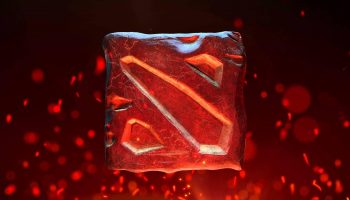This post will have three parts to it:
- What are NFTs and how do they work?
- How do companies and marketplaces create an economy around NFTs? (and why are so many of these scam-y)
- Summary and Conclusion
Keep in mind this is only a basic overview to give Dota players a very basic level understanding in this topic since recently Dota personalities and organizations have been collaborating with companies and organizations that deal in the NFT business. As such there will be many details either simplified or missing.
1. What are NFTs and how do they work
NFT stands for "non-fungible token" and are a form of unique digital token whose properties are assured via a blockchain.
Let's unpack this definition bit by bit.
An NFT is a token that can be "minted" (that's what it's called when an NFT is created) out of any piece of data, be it a piece of digital art, music, video, tweets, files, etc.
The idea of an NFT is that they are a token that is guaranteed to be unique, non-reproducable, cannot be copied or modified or stolen.
You might be wondering how this can be true, why can't I just copy/paste an NFT or copy it from someone else or just write my own and act like I officially minted it?
The answer lies in the blockchain technology.
I'm not going to go too deep into blockchain technology because this is just about NFTs and how they are used by Dota personalities/orgs, so just as a quick overview:
A blockchain is based on a digital "ledger" that keeps track of all transactions made.
Basically this means whenever an NFT is minted, traded, bought, or sold an entry of this action is left behind in the ledger and this ledger is publically available for everyone to see. The reason why this ledger is secure and people cannot (at least in practicality) interfere with the ledger and simply lie about their transactions is because in order to screw with the ledger you need to overcome cryptographic security measures that are not practically able to be overcome, therefore assuring that the ledger is always correct and that every NFT that is mentioned in the ledger is unique and cannot be fked with.
Once again I am skipping over a lot of stuff or simplifying things but this is just a basic layman's overview.
The point of NFTs is that since they can be minted out of digital content like digital art, a digital artist can create an NFT for their piece of art and then sell that NFT to buyers.
In real life, in order to own a painting you have to buy the physical painting and other people can only buy reproductions or photos of that painting, but only you have the original.
With digital art however, people can of course copy any piece of digital art so "ownership" of a piece of art only exists in the realm of copyright, but digitally everyone can copy it.
NFTs are the answer to this by allowing someone to digitally own a piece of art by buying the NFT that was minted from that piece of art. This doesn't stop other people from simply copying that piece of art anyway, but at least you can now tell everyone that you "officially" own that piece of art (although that is another can of worms, because you don't actually own that piece of artwork, the copyright and rights of reproduction and distribution of that piece of art still lies with the original owner; All you get is basically a token of acknowledgement by the artist that you "own" this piece of art "officially")
Everything that I have told you so far is how NFTs work and what they are supposed to accomplish, but what does all of this have to do with Dota?
Well, as mentioned before some Dota personalities/orgs have partnered with companies that market NFTs, and with everything you have read so far you might already be thinking "but NFTs have no intrinsic value, why would anyone pay hundreds of dollars for them?" but the answer to that is shocking: People that mint and sell NFTs know they have no intrinsic value. That's not the point. No one is arguing if NFTs themselves have intrinsic value, everyone agrees they don't (in their base form but more about that later). The point is you can buy and sell them and different people have different expectations for how much you can buy and sell NFTs. This creates a market. THAT is the whole point of NFT business.
This brings us to the second part of this thread.
2. How does the NFT economy work and what do I need to look out for when Dota personalities/orgs collab with NFT marketplaces?
I said above that NFTs have no intrinsic value to them, since they do not confer any legal rights to you over the subject of the NFT. However, they still have some form of value to them, because there are only a certain number of NFTs that are officially minted and recognized by the creator of whatever piece of media the NFT was minted from, which means that NFTs are a sort of collector's item.
Collector's items are known to have a higher value ascribed to them as they are physically worth, but the prestige an owner feels from owning these items gives NFTs some sort of non-quantifiable value.
Here is where we get to the juicy bit:
Because as collector's items NFTs have a non-quantifiable value to them, they can be sold for a large price if that price is what a collector is willing to pay for them.
That in itself is not a bad thing and not a scam.
HOWEVER, the main problem (and the reason why businesses dealing in the minting or trading of NFTs are seen as scams) is that because NFTs are endlessly producible and have no intrinsic value but only a value prescribed by their demand, nothing is stopping businesses from inflating the prices of NFTs through underhanded tactics or manipulating buyer intentions.
EXAMPLE:
Imagine you see an NFT for an amazing piece of art and you believe "the NFT for this art is probably worth 500 bucks because on this marketplace all other pieces of art of this quality had NFTs around 500 bucks" and you see the NFT is currently up for grabs for 200 bucks. You might be inclined to think "OH MY GOD I should buy this NFT and then re-sell it for 500 bucks and make a profit of 300 bucks!"
First off, you have no idea of knowing if the NFTs for these artpieces really are worth 500 bucks because these prices are potentially only that high because employees of the company running the marketplace might have inflated that price themselves.
Secondly, if you buy that NFT thinking you can re-sell it for more later, how do you know you will actually be successfull? What if you end up sitting on that NFT forever and find no buyer? You just paid 200 bucks for a token of a piece of digital art anyone else can just copy/paste onto their hard drive and no one will buy it from you. And the person selling that NFT just made 200 bucks out of thin air, because it costs almost nothing to mint an NFT, and the company running that marketplace you bought it on took a small cut in transaction fees.
I will mention that there are many, MANY different types of companies in the NFT business, some that run marketplaces like the one in the example I described above, others that will allow people to play games they developed with NFTs as in-game items or characters or currency, there are many different ways companies will hype up their usage of NFTs, but ultimately every single company (that I have personally seen) that bases its business around creating content that incorporates the trading of NFTs does not actually have a revolutionary idea and instead probably just uses their pitch to hype up their NFTs to drive up their imaginary price to sell them for a lot of money. The more people BELIEVE that an NFT is worth a lot (so they can re-sell it for more later), the more NFTs will be sold for.
Does this mean all NFTs are bad and NFTs are a work of Lucifer/Doom?
No. Absolutely Not. NFT technology in itself is simply a tool. The tool of NFT technology itself is not an evil and it is possible that at some point a company will figure out how to use this technology to actually make something really cool and unique that is worth sticking around for, but so far we have seen 0 (in words: zero) companies actually achieve this, but HUNDREDS of companies that ADVERTISE that they are the one company to do it (ultimately to hype up the price of their NFTs).
This is the main reason why you will find such harsh pushback whenever NFTs are declared a scam: They first off aren't a scam by themselves, they are simply a tool, and secondly every company dealing on NFTs actually believes their own hype that they are the one only company that will usher forth the golden rule of NFTs and go "no actually our company really is legit wink" (Main reason why I spoke out against Zyori entering a business that deals in NFT, although I do legitimately wish him all the best; I would love to see a company actually make something with NFTs that is worthwhile)
3. In Summary
NFTs themselves are good for creating digital collector's items which aren't by themselves bad but because their value is not defined, companies and personalities will hype up their NFTs, potentially manipulate the prices of those NFTs and hope they can find people who are either willing to buy them at exorbitant prices or people that believe they can buy an NFT at a high price to sell it later at a higher price to flip a profit only to ultimately end up hundreds of bucks out.
Does this mean the entire NFT market is purely based on Belief? YES!
I want to stress that not everyone buying NFTs actually believes they have intrinsic value; I think most people buying NFTs simply believe they can later sell them at a higher price to another sucker, but the main problem for that is no one can tell how much an NFT is actually going to go for, and initial prices are potentially jacked up artifically by companies.
Where does that leave us with Dota personalities/orgs dealing with businesses specializing in NFTs?
Ultimately, if any company hypes up their NFTs by throwing buzzwords or runs an NFT marketplace where the company deals not in real money but with fake currency and takes a cut of transactions, I would be extremely wary and not buy anything they sell.
NFTs themselves aren't evil, but they are certainly being used by large companies to rake in millions off of smaller businesses and private people speculating on NFT values.
Does that mean we should immediately denounce every Dota personality/OrG that deals with such companies?
At the end of the day, business is business and it's not up to me to denounce business decisions that rake in tons of cash. Business is always at the expense of suckers dumb enough to be the ones on the losing end since you cannot make money without other people losing money.
However, I would definitely be willing to denounce OrGs that work together with a company that has had shaky legal grounds for their operations and very likely uses shady and illegal practices in their dealings and got into problems with the law over these problems in the past (not going to mention any names, but if you watched Gorgc's stream highlights lately about a certain O(r)G you might know which company I mean).
I won't denounce O(r)G(s) over making positive financial decisions, but I will denounce them over dealing with a company that is just one step away from getting sued out of existence. NFTs might not be the boogeyman for that company, but they sure are the boogeyman's weapon.
(Cue the dozens of people inviting me to actually have a talk about NFTs just to reiterate what I already know. Im not debating if NFTs have value or not or what their potentials are. My point is the marketplace surrounding them is not healthy and too easily manipulatable and too easily can cause unknowing people to lose thousands of bucks)
Source: https://www.reddit.com/r/DotA2/comments/or0k7o/in_light_of_recent_dealings_a_quick_overview_what/







